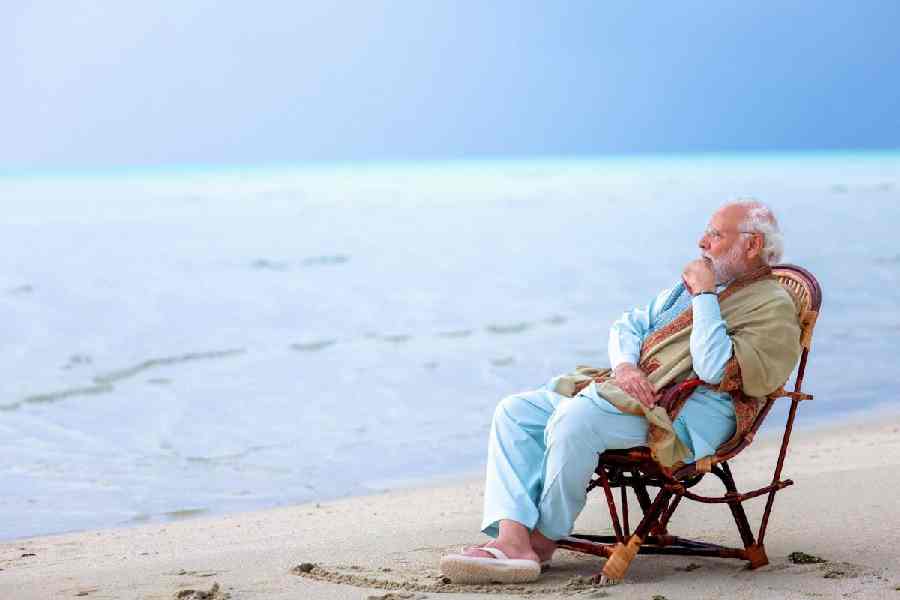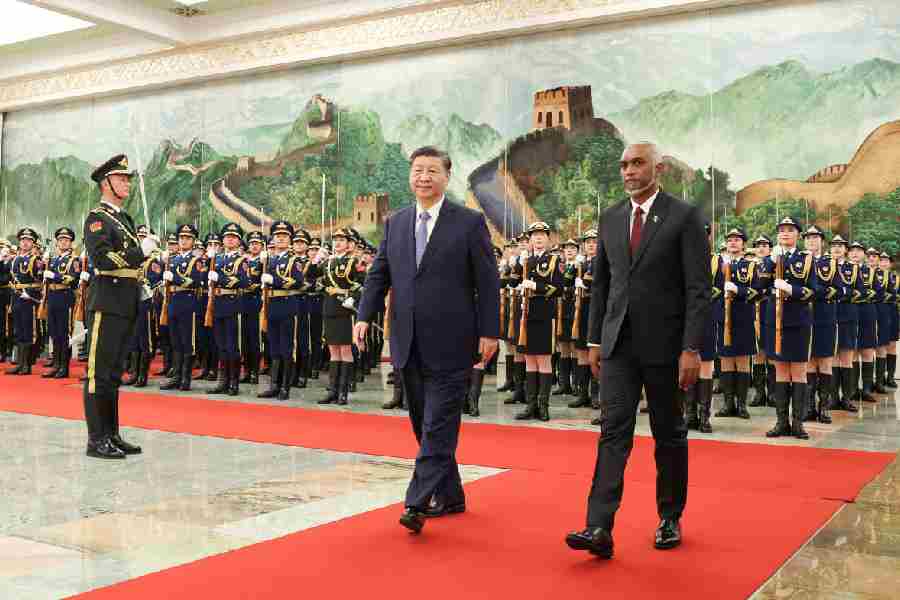Is it impossible for a muscular giant country like India to stay on friendly terms with its tiny neighbours? Is Big Brother syndrome bound to kick in at some stage in the relationship?
The answer, inevitably, is that it’s tough for India not to lean on its smaller neighbours every now and then. But now another factor invariably creeps into the picture during the constant tug-of-war between India and the other smaller nations in our region: China. Even Bhutan, after allowing India to handle all its diplomatic affairs, is now conducting its own negotiations with China.
So in Nepal, Sri Lanka and the Maldives, India has found itself up against political parties that lean towards the Chinese. In Sri Lanka, India was glad to see the Rajapaksas lose out against their rivals. But now India’s facing a unique situation in the Maldives where a political party has romped to power after making an anti-India stand its key election plank.
So India could only watch as the Maldives president, Mohammad Muizzu, first failed to invite Prime Minister Narendra Modi for his swearing in ceremony.
The contrast couldn’t have been starker. In China, Maldives President Mohammed Muizzu was getting a guard of honour and the red carpet treatment in Beijing’s Great Hall of the People with President Xi Jinping by his side.
India’s only response came when Prime Minister Narendra Modi, last week, spent time in the Laccadives, snorkelling and sitting in tranquil splendour on a golden beach.
Muizzu spent five full days in China and has avoided India as the first port of call as the new President. In Beijing, the joint communique issued Thursday was by diplomatic standards extraordinarily effusive, almost gushing. It declared that in a changing world, “the strategic significance of China- Maldives relations has become more prominent.” As a result, it continued: “The two sides agree to elevate China-Maldives relations to a comprehensive strategic cooperative partnership,” that would, “work toward a China-Maldives community with a shared future.”
India could only watch as the Beijing lovefest played out. But, earlier in the week, India punched back by announcing it would be developing a new airport that could serve both civilian and military aircraft on Minicoy, which lies 130km from the northernmost Maldives island. India is also talking about building luxury resorts that could offer competition to the high-end vacation playgrounds in the Maldives. But while the Lackshwadeep archipelago is a tropical paradise with its sandy white beaches, it’s barely one-tenth the size of the Maldives and has no seven-star resorts like the ones that have come up in the Maldives. Developing a tourism industry in the pristine archipelago – and one that’s hopefully eco-friendly – can’t happen overnight.
Still, Modi’s trip to Lakshwadeep and his praise for the archipelago clearly hit a raw nerve. Three new Maldivian ministers fired off a string of insulting tweets calling Modi “a terrorist” and “a clown,” amongst other things. Even Muizzu, who fought an “India-out” election campaign, realised the ministers had massively overstepped the line and was forced to suspend all three.

Indian Prime Minister Modi on a trip to Lakshadweep. File picture.
It’s an old proverb that when two elephants fight, the grass gets trampled. But until now, the Maldives has been doing extraordinarily well as the elephants stamp about and trumpet loudly. External Affairs Minister S. Jaishankar was in the tiny island nation – population 5.21 million – in early 2022 to hand over a chain of 10 radar stations built with a $15.8 million Indian aid package. Jaishankar also inaugurated a police training college and the Exim Bank will be giving a $40-million aid package to set up a chain of police stations on the bigger, inhabited islands. We also train the lion's share of their soldiers.
But India’s clearly played its cards clumsily in recent years. As a result, it’s now facing a government that’s almost rabidly anti-Indian and has so far been quite willing to demonstrate it. Says one diplomatic analyst: “It’s a lot of internal politics. There’s Chinese money combined with a healthy dose of Islamic radicalism.”
Says another analyst: “How did we miss the ground realities? We must do a post-mortem on why an anti-India campaign was allowed to take charge of the political narrative, despite our handsome development assistance.”
At the military level too, India has attempted to draw the Maldives ever closer to it. Since 2009, the two countries, which have been tight allies for over half a century, have held an annual joint military exercise called Ekuverin, which take place alternatively in India and in the Maldives. Another exercise, Ekatha was carried out between the two navies in 2023. The Indian armed forces stationed with helicopters in the Maldives have carried out hundreds of rescues and medical evacuations in the last few years. Muizzu made it one of his key election planks that the 100-or-so Indian military officers would leave the country, declaring he didn’t “want any foreign military boots on Maldivian soil.” This could pose the first big diplomatic and military challenge for Muizzu as so far it doesn’t look like India has any intention of moving its troops.
Besides all this, India’s also building a $500-million, 6.74-km bridge that will connect Male with nearby islands. Even Muizzu has indicated that he would like this project to continue and, in fact, be accelerated. India’s also building a harbour at Uthuru Thila Falhu island.
The fact is that the Maldives are strategically located and are an excellent watching post that can keep an eye out in the Arabian Sea and the Indian Ocean. And the Chinese know their presence on the islands are a thorn in India’s side because the archipelago is so close to India. Crucially, a Chinese-made bridge connects the Maldivian capital Male and a neighbouring island on which the country’s main airport has been built.
The pro-China Progressive Party of Maldives (PPM) came into being in 2011 led by Maumoon Abdulla Gayoom who claimed the Maldives’ India-First policy undermined Maldives’ autonomy. Gayoom was in power from 2013 to 2018 and during that time, handed out several expensive infrastructure projects to the Chinese. These, however, may have pushed the islands into a Chinese debt-trap. The Maldives owes China about $1.3 billion which amounts to some 20 per cent of its total debt.
India’s biggest champion has been Mohamed Nasheed, the country’s first democratically elected president. He came to power in 2008, has always been pro-Indian. But he abstained from contesting in the presidential race.
In the Maldives’ fractured political landscape, India was forced to back the incumbent Ibrahim Solih who was unable to put together a strong coalition to support his re-election. He’s strongly pro-India but the Opposition accused his government of putting a vast system of political patronage.
In 2019, Solih led his party to a scorching victory. But afterward publications like Dhiyares News and the Maldives kept up a constant India-bashing campaign, hammering away at New Delhi’s outsized economic and political influence in the Maldives. Says one analyst: “Nasheed might have delivered if he’d been running. But Solih couldn’t.”
Some analysts trace the rise of anti-Indian sentiment back to the time when GMR won the contract to build the Maldives airport. They were later forced to abandon the project after the government changed and cancelled the contract in a row over passenger airport development fees that became politically heated. Also, there's also the fact the Wahhabi influence had reached the islands. In addition, the Maldivians have always resented that Minicoy joined India after a referendum in 1956.
The Maldivians also looked very warily upon the BJP government. That exploded during Yoga Day in June 2022 when a rumour spread that the exercises had a religious angle. The result was violence in the stadium where it took place and the Indians there had to be escorted to safety.
But Muizzu, who came to power with 54 per cent of the vote, has a tricky tourist and logistics problem on his hands. The Maldivian economy which is heavily dependent on tourism, took a beating during the Covid-19 pandemic and the Chinese tourists have still not returned. Their place has been taken by Indian tourists who now form 11 per cent of the total number of visitors. In the last few days, after a social media storm erupted, many Indians have cancelled their bookings. India also supplies the Maldives with a whole range of essential foodstuffs from rice and fruit to vegetables and poultry. In addition, it provides all its medicines from aspirin and blood pressure pills to critical care drugs.
Can the Maldives afford to pick a fight with its giant neighbour and survive the economic fallout that’s bound to follow? On the face of it, this wouldn’t even be a David and Goliath story. It would be like an ant taking on an elephant. But India should make its moves cautiously – it shouldn’t forget that Castro’s Cuba has thumbed its nose at the US for the last 60 years.
Nevertheless, Indian analysts are convinced the Maldives will come out the worse if it doesn’t tone down its anti-Indian moves. Says one: “For the Maldives, the Chinese embrace will prove fatal. The next six-to-eight months will be worth watching.”










